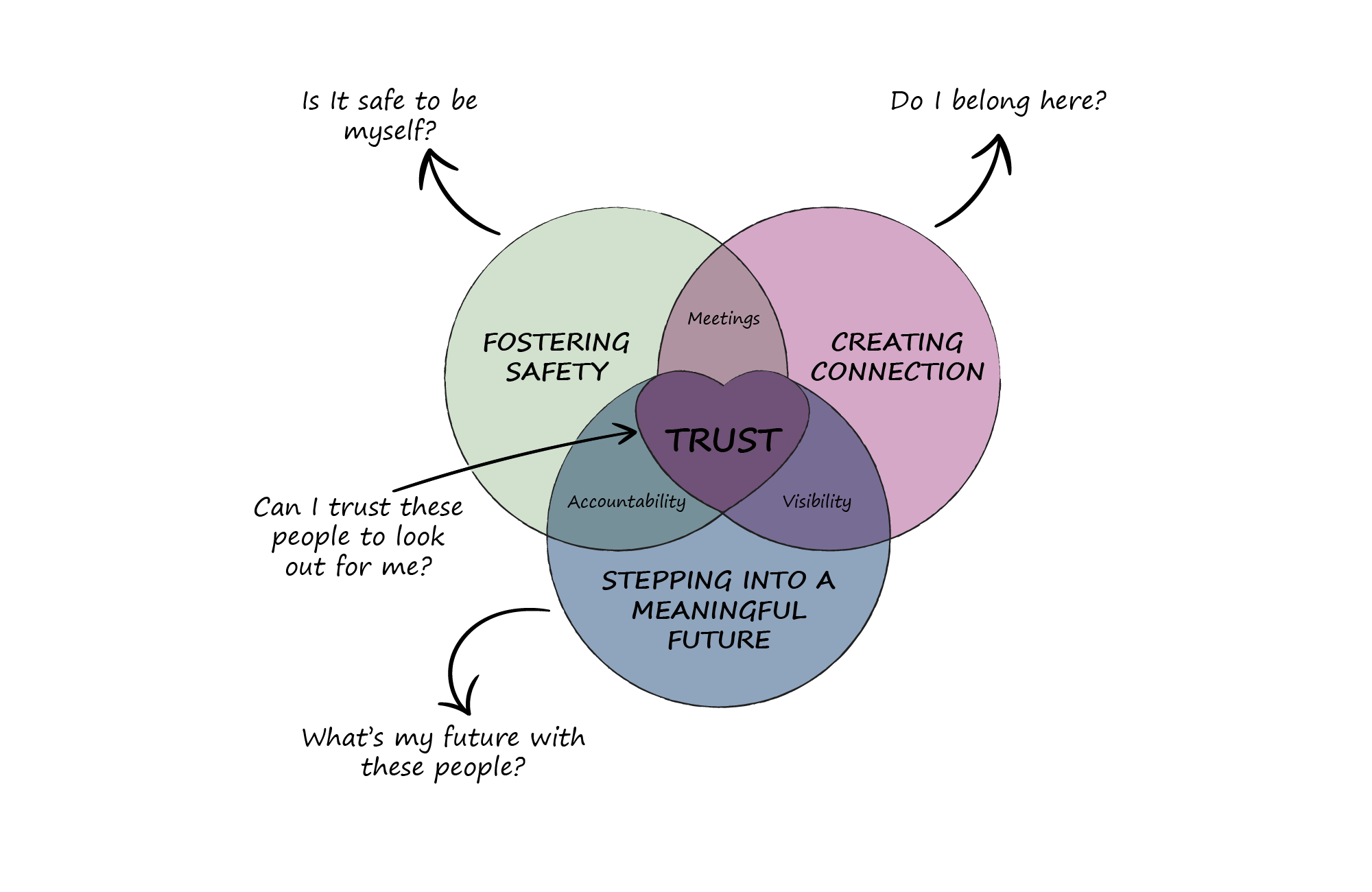
Our brains are naturally wired to seek out certainty and a sense of safety.
Great delegation is about being an accountability partner to help your reports grow their capabilities.
Where we can often get stuck with delegation is we confuse it with being about giving people appropriate tasks.
In my coaching practice, the most common stumbling block to delegation is that managers are fearful of overwhelming their employees with too much work. While it is commendable to protect the wellbeing of your employees, the truth is that it often means managers are picking up the slack.
Yet, we will get better results if we shift our mindset to understanding that delegation is about improving the skill levels of our direct reports. And believing in their potential.
It can be misguided to shelter your team from too much work because long term, it reduces their capability to get work done. Paradoxically, they start to feel they aren't trusted which can reduce engagement and team morale.
When it comes to delegation a leader's role is to:
Of course, what can hold us back from delegation is when things goes wrong - employees refusing to learn a new task, making mistakes or not caring enough. It can makes us fearful about delegating and we hold back.
What I find through working with leaders to improve delegation is that they use a one-size-fits-all approach. We think because we learnt to do a task quickly that our employee will do the same. Then, we get disappointed when they seem unable to grasp what to do in the timeline we expect.
How we communicate how to do a task needs to be modified per person. After all, we all have different work and communication styles. Assuming people are just like you can create all sorts of issues. That's why coming from the mindset of being an accountability partner that is there to support your direct report to live their potential can be so helpful.
It means throwing away our assumptions and co-creating with each report. After all, if we want to build trust with our team members, we need to work towards shared trust. It's what I believe is the ultimate expression of trust where we both get clear on what we each need to trust one other.
At the heart of a good delegation process is clear communication. And this is what these three steps enable you to do.
So let's get started.
Good delegation involves some deep thinking first about the task or project. A common mistake is that most managers talk about the tasks as they are delegating.
While it seems reasonable to believe that delegating on the fly saves time, it does increase the potential for rework, errors, conflict, unclear directives and expectations.
Good planning can be a lot work initially. It's where we need to spend the most time, but usually spend the least. The more complicated the task, the more planning is required.
Planning gives us the space to get really clear on the tasks that need to be done and our expectations.
After all, our expectations can create a lot of havoc and hurt feelings if we are not clear. As James Clear says, "Expectations can be helpful as a motivator and unhelpful as a measuring stick."
During planning, get clear on your expectations through four different lens - faster, safer, better and cheaper. What is the timeline to complete? How do you need the work to be done safely? How long have they got to work on the task? What quality outcomes are you or the client requiring? What budgetary guidelines do they need to work with in?
Planning is also when we select the best person for the job. Taking into consideration the need to train everyone up in the team, the time required for the task, the level of task importance/urgency and that we are not overloading high performers.
Thinking through the consequences of good work - or bad work is also important. Leaders often forget to make clear consequences as they assume they are implied. But this does need to be thought out, so there is no confusion.
Great delegation involves facilitating two-way dialogue on the tasks, your expectations and outcomes. You want to make sure you are getting buy-in from your report and providing the opportunity for them to ask questions and share any concerns. This is where you check in with them and ensure they are on the same wavelength to you.
This is foundational to creating shared trust and improving accountability - you are co-creating together mutual expectations, a shared understanding of the project and building agreement and timelines.
While your planning process will get you clear on the tasks to be done, when, why, who needs to do it and how, there will be gaps you can't answer on your own.
Communicating your expectations revolves around considering both good and bad outcomes before starting, as opposed to receiving a negative outcome and then deciding what to do after the fact.
You also want to discuss why the work matters - how it helps them, you, the team or customers. And you want to increase their engagement by empowering them to use their own personal style. Say for example, they are creating a standard operating procedure, while they might have to write in a certain way, you can give them the freedom to create drawings and charts in their own style.
Working with them on how to measure success is also important, as well as uncovering what potential challenges they might face. This will ensure you can reduce bottlenecks and help them access the right resources.
Finally, you want to work with them to agree on the best frequency of check-ins - so they feel supported and you don't feel like you're micromanaging.
Engaging in delegation through active participation and open discussion allows you to gauge their level of involvement and commitment. This gives you the opportunity to delegate to someone else, if you are concerned about their level of confidence, competence or motivation.
Of course, having delegated you need a good system to ensure you are providing the right level of individual support and not paving the way for reverse delegation (where they hand the work back to you for you to do!).
Best practices involves leading with questions and refraining from jumping in to help. Rather than telling people what they need to do, you can strengthen your report's ability to think for themselves by asking "What do you think you need to do next?"
Providing recognition, where you give specific feedback on what they are doing right, rewards the right behaviours. While providing actionable feedback on where they need to improve, helps them understand what they need to do moving forward.
How you react to mistakes is also important. Be mindful of your facial expressions and interactions when they mess up. Practise staying calm when mistakes are made and asking them "What did you learn from that?" is more helpful and provides the safety people need to learn.
This also means asking for feedback on how you can improve the delegation process. Having the maturity to ask on what you can do differently, models the right behaviours required for a culture of feedback and high performance.
Finally, celebrating what people have learnt or tasks they have started to learn and the results they are getting is important to reinforce the right behaviours in your team.
Great delegation is really about good communication and working with your direct report to encourage their participation. This approach needs to differ for each of your reports, as they all have different communication, work, personality and learning styles.
Planning what needs to be done beforehand, and getting clear on your expectations and desired outcomes ensures you provide the clear foundational communication necessary to start dialogue on their potential contribution.
While sitting down with them to co-create a plan moving forward that supports them, and you, ensures there is no confusion or a lack of commitment. Then, following best practices for checking in on their work avoids any feeling of micromanagement and potential frustration, from both parties.
When you work with your report as an accountability partner, to support them in learning and accomplishing tasks, you demonstrate that you are a boss that cares about them - both their wellbeing and their career development. And that's the job of a trusted leader.

Our brains are naturally wired to seek out certainty and a sense of safety.

In last week’s post, we talked about fostering psychological safety in your team to improve performance. But it’s only one component.